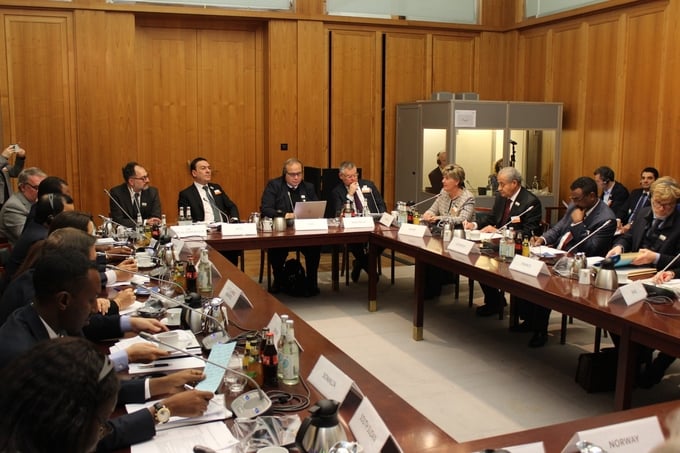November 25, 2025 | 17:24 GMT +7
November 25, 2025 | 17:24 GMT +7
Hotline: 0913.378.918
November 25, 2025 | 17:24 GMT +7
Hotline: 0913.378.918

FAO Chief Economist Máximo Torero moderated a breakout session on “Agrifood systems transformation: a worldwide response to multiple crises”
The Food and Agriculture Organization of the United Nations (FAO) today underlined the crucial importance of concrete measures to accelerate people’s access to healthy diets by transforming agrifood systems to be more resilient, efficient, sustainable and inclusive.
“We need to increase resilience; that means capacity to prevent, capacity to absorb and capacity to build back better," said FAO Chief Economist Máximo Torero, who moderated a breakout session at a ministerial meeting of the Global Forum for Food and Agriculture focused on “Agrifood systems transformation: a worldwide response to multiple crises”.
Among the themes underlined by many countries and organizations in the session was the need for open, transparent and free agrifood markets and trade, critical to address current food security issues.
Another key takeaway was that the challenges of the agriculture sector are similar across the world, including extreme climate events such as floods and droughts, soaring prices for agricultural inputs and the impacts of the COVID-19 pandemic and the war in Ukraine.
Need to boost resilience highlighted
To address these issues, the need to boost the resilience at country level for farmers and especially for smallholder farmers was particularly highlighted, along with the importance of putting agrifood systems centre stage at the upcoming COP28 climate talks. Agriculture contributes to greenhouse gas emissions and at the same time is vulnerable to climate change, hence agrifood systems should be a key topic at the upcoming discussions.
The final GFFA communique highlighted the role of the inter-agency Agricultural Market Information System (AMIS) as well as a number of initiatives in which FAO plays a key role including: the International Treaty on Plant Genetic Resources for Food and Agriculture, the FAO Commission on Genetic Resources for Food and Agriculture , the FAO Framework for Action on Biodiversity for Food and Agriculture, FAO’s work on soil mapping and the establishment of a UN Food Systems Coordination Hub hosted at FAO.
Finance and urban food discussions
Over the three-day GFFA meeting, FAO participated in a High Level Panel and held several expert panels including: Financing sustainable transformation in the agrifood systems: Gaps and opportunities. This event highlighted the fact that agriculture and land use received only 26 per cent of the global climate finance flows to all sectors between 2000 and 2018. In this context, a boost in investment is essential to transform the world’s agrifood systems, while supporting countries’ access to climate finance and ensuring that appropriate financial resoures reach small and medium-scale food producers.
Leveraging urban and local food systems for sustainable food systems transformation. Urbanization, along with climate change and technological progress, is contributing to a sea change in the way we produce and consume our food, meaning cities and local governments need greater support in helping build a sustainable agrifood systems transformation. With 70 percent of global food consumed in urban areas, the event focused on innovative ways to strengthen the role and function of urban and local food systems. The FAO flagship report on the State of Food Security and Nutrition in the World 2023, to be launched in July, will address the same issue.
At the GFFA Innovation Forum, FAO presented the Organization’s efforts to help strengthen the link between science, research and development, and facilitate the development and scaling up of innovation processes (such as Codex Alimentarius, Farmer Field Schools, and the Hand-in-Hand geospatial platform).
Further innovative tools include WaPOR to monitor agricultural water productivity through satellite data, eLocust3 – an innovative early warning tool for possible locust outbreaks –, and the Digital Village Initiative. FAO’s Office of Climate Change, Biodiversity and Environment also presented projects on accelerating action towards climate-friendly agrifood systems.
(FAO.org)

(VAN) Brazil's COP30 presidency pushed through a compromise climate deal on Saturday that would boost finance for poor nations coping with global warming but that omitted any mention of the fossil fuels driving it.

(VAN) Poultry farmers in the UK have been warned that they could face one of the worst winters yet for bird flu.

(VAN) Prices of main-crop paddy have risen sharply, with jasmine rice hitting 16,100 baht per tonne — the highest level in years.

(VAN) In Brazil, FAO unveiled a series of reports and initiatives showing how sustainable agrifood systems are a solution to the climate crisis.

(VAN) With names like neodymium and dysprosium, rare-earth elements sound exotic — and their perceived scarcity has only added to the mystique.

(VAN) In a new study published in Trends in Biotechnology, researchers used a gene-editing technology called CRISPR to increase a fungus's production efficiency and cut its production-related environmental impact by as much as 61%- all without adding any foreign DNA.

(VAN) A top official in Beijing’s Cop delegation says China is committed to clean energy – but US’s absence is a problem.